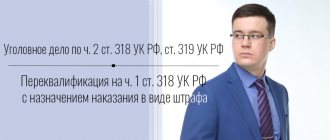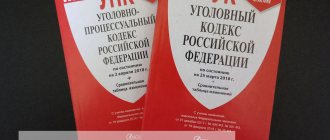The qualification of a crime is the establishment of compliance of the committed act with the characteristics of a particular crime. At the stage of initiating a criminal case, the preliminary investigation authorities do not yet have the full picture of the crime, therefore the choice of qualifications is preliminary.
The qualification when passing a sentence is final; it represents the result of the work of the investigation, the prosecutor, and the court in assessing the guilty act committed. Thus, at any stage of the criminal case, the corpus delicti can be changed. Reclassification of a crime to a more serious one or reclassification of a crime to a less serious one is an issue resolved by our criminal lawyers.
ATTENTION : our criminal lawyer will help in the matter of reclassifying the crime to a less serious one if you are the accused or more serious if you are the victim in the case: professionally, on favorable terms and on time. Call today!
Grounds for reclassification of a crime
Among the grounds for changing the classification of a crime, the following are usually distinguished:
- change in the facts of the case . During the investigation of the case, it may be revealed that the robbery was committed not by one person, but by two, which will be a change in the classification of the crime to one committed by a group of persons;
- change in criminal law . During the investigation process, legislation may change. For example, when the Criminal Code of the Russian Federation was introduced in 1997, some criminal offenses were classified as inviolable acts;
- investigator's mistake . Some crimes committed may be quite complex to qualify. For example, how do you classify the theft of a winning lottery ticket? Like the theft of a ticket of a certain value, or theft in the amount of the winnings?
In practice, on the above grounds, the crime committed can be reclassified more than once.
How is the reclassification of the crime carried out?
The legislator has established a procedure for reclassifying the corpus delicti depending on the stage of the criminal case.
- Stage of initiating a criminal case . At this stage, a decision is made to initiate a criminal case and a preliminary qualification of the guilty act is given. In the future, during the investigation, if new circumstances of the commission of a crime are discovered, it is possible to change the qualifications of its composition. The final version of the qualification, like all case materials, is transferred to the prosecutor. The prosecutor either agrees with the selected article for qualification of the composition, or returns the case to the investigator, who changes the qualification during the inspection. In cases where the victim is accused, the prosecutor himself has the right to remove some materials from the case and soften the indictment.
- Trial stage . In accordance with Art. 252 of the Criminal Procedure Code of the Russian Federation, trial is possible only on charges that were brought at the investigation stage. If this article is violated and the situation worsens for the defendant, he has the right to appeal the violation of his rights personally or through a lawyer.
Before the court is removed to the deliberation room, the state prosecution has the right to:
- remove signs in the actions of the defendant of a more serious crime;
- reclassify the act to a milder one;
- exclude references to norms containing other crimes.
As a result of the trial, it is permissible to reclassify the crime to another article, which will cover only part of the previously charged crime.
Termination of the case or retraining?
This case may be interesting for legal practice due to the very fact of the event - the criminal case was returned to the prosecutor at the request of not the defense lawyer, but the representative of the victim. By the decision to return the case to the prosecutor, the court explained to the state prosecution that the lawyer’s reference to the rarely used in practice Resolution of the Constitutional Court of the Russian Federation of December 8, 2003 No. 18-P “On checking the constitutionality of the provisions of Articles 125, 219, 227, 236, 237, 239, 246 , 254, 271, 378, 405 and 408, as well as Chapters 35 and 39 of the Criminal Procedure Code of the Russian Federation in connection with requests from courts of general jurisdiction and complaints from citizens” is justified and procedurally justified.
In April 2022, minor X. called an unfamiliar interlocutor a fool on a social network. Oh times, oh morals! We are returning to Pushkin's era again! Until recently, boys called girls they barely knew words that were not only awkward to say out loud, but also technically difficult to write. And here - “fool”! For a person who is an eyewitness to online “battles” using “basement” vocabulary, this word is associated with crinolines, bows and the gentle flutter of curtains. But the girl, obviously, had not heard about the hussars and told another friend, V., that she was offended. This message was apparently worded in such a way that one could imagine that she was thinking of committing suicide. Then, to prevent this from happening, V. met with X. and “laid hands” on him. Having torn his T-shirt like the Assistant Professor in “Gentlemen of Fortune,” he dealt the young man at least 15 blows to the face. Based on the results of a forensic examination, the victim was diagnosed with a closed fracture of the bones of the facial skeleton and a closed craniocerebral injury, which was classified as harm to health of moderate severity, and he was prosecuted under Part 1 of Art. 112 of the Criminal Code of the Russian Federation.
But, as in many criminal cases, there were much more unobvious phenomena in this case than obvious ones. Thus, V. beat X., without a reason for this, in a public place, publicly undressing down to his trousers, in the presence of minors of different ages, disdaining public ideas about morality and morality. Knowing this from the materials of the criminal case, even a first-year law student will probably wonder why, in fact, the act was qualified under Part 1 of Art. 112, when does it follow from the circumstances of the case that Part 2 of this article cannot be avoided? And this is where the fun begins...
For almost a year, Kh. and his legal representative were not recognized as victims by the criminal prosecution body, while the inquiry body declared the perpetrators as “unidentified,” which, in his opinion, gave the investigator, despite the requirements of Art. 223 of the Code of Criminal Procedure, the right to extend the period of inquiry indefinitely.
I think it is pointless to speculate about the reasons for such a careless (or, on the contrary, diligent?) attitude towards service. Meanwhile, the period for bringing V. to criminal responsibility has expired. The fact is that crimes under Part 1 of Art. 112 of the Criminal Code in accordance with the requirements of Art. 15 of the Code refer to crimes of minor gravity, and the accused was a minor at that time. Taken together, this gave rise to a situation in which, according to Art. 78 of the Criminal Code, a person is released from criminal liability if two years have passed from the date of commission of a minor crime. For minors, this period is one year. Thus, the body of inquiry created, in my opinion, artificial conditions for V.’s release from criminal liability. Eventually the case went to trial.
In court, after the judicial investigation, the lawyers filed two petitions. The defendant's defense counsel requests termination of criminal prosecution due to the expiration of the time limit for criminal prosecution. I, as a representative of the victim, disagreed with the qualification of the criminal act - to return the case to the prosecutor on the basis of clause 6 of Part 1 of Art. 237 Code of Criminal Procedure.
In my petition, I explained that in accordance with paragraph 6 of Part 1 of Art. 237 of the Code of Criminal Procedure, the judge, at the request of the party, returns the case to the prosecutor to remove obstacles to its consideration by the court, if the factual circumstances set out in the indictment indicate the presence of grounds for classifying the actions of the accused as a more serious crime, or during the preliminary hearing or trial, factual circumstances indicating for the presence of grounds for qualifying the actions of the specified person as a more serious crime, a socially dangerous act.
According to the law, the basis for returning the case to the prosecutor are significant violations of the Code of Criminal Procedure committed at the pre-trial stage of the case, which cannot be eliminated during the trial, due to which the possibility of a court verdict is excluded.
I also drew the court’s attention to the Constitutional Court Resolution No. 18-P of December 8, 2003, namely, to the content of Art. 215, 220, 221, 225, 226 of the Code of Criminal Procedure, according to which an indictment or indictment as the final documents of an investigation or inquiry, issued upon completion, are drawn up when investigative actions in the case have been carried out, and the collected evidence is sufficient to draw up these documents. It follows from this that if violations of the Code of Criminal Procedure are committed at the inquiry stage, then neither the indictment nor the indictment can be considered drawn up in accordance with the requirements of the Code. In my opinion, there were enough such violations in this case.
In addition, I indicated that, according to Art. 73 of the Code of Criminal Procedure, the circumstances to be proven in criminal proceedings are, among others, the event of the crime, the time, place, method and other circumstances of its commission, as well as the nature and extent of the damage caused by the crime. In this case, the mentioned circumstances were not fully established and assessed.
In the petition to return the case to the prosecutor, I also referred to the legal position of the Supreme Court of the Russian Federation, set out in the Resolution of the Plenum of November 15, 2007 No. 45, according to which criminal acts committed out of hooligan motives should be understood as deliberate actions directed against a person’s personality that were committed without reason or using an insignificant reason (hooligan motives when committing a criminal act under Article 112 of the Criminal Code are a qualifying feature of Part 2 of Article 112 of the Code). The said resolution also noted that when deciding whether the defendant’s actions constituted a gross violation of public order, expressing clear disrespect for society, the courts should take into account the manner, time, place of their commission, as well as the intensity, duration and other circumstances.
Clear disrespect for society is expressed in a deliberate violation of generally accepted norms and rules of behavior, dictated by the desire of the perpetrator to oppose himself to others, to demonstrate a disdainful attitude towards them. The court must establish what specifically constituted a gross violation of public order, what circumstances indicated a clear disrespect of the perpetrator for society. In the case under consideration, V. partially tore off his clothes, demonstrating his naked body as a dominant, he beat a minor in a public place - on an open-air playground near a store in a garden society, in the presence of minors, including those under 16 years of age, in including girls. Therefore, the criminal prosecution body, in my opinion, had every reason to see hooligan motives in the actions of the accused. But instead, the investigator avoided not only assessing these circumstances, but also avoiding mentioning it.
In addition, as noted in the petition, the court must reliably establish that the person had direct intent aimed at grossly violating public order and showing clear disrespect for society. The fact that V., along with the intent to cause harm to Kh.’s health, had the intent to intimidate those present and place himself in a dominant position using methods subject to condemnation not only by moral critics, but also by theorists of criminal law, the investigator, in my opinion, should not have remain in doubt.
As a result, the court, agreeing with the arguments of the petition, ruled that the investigating authorities did not assess whether the actions of the accused resulted in a gross violation of public order, generally accepted norms and rules of behavior in society, and safety in public places; whether they violated the peace of an indefinitely large circle of people, the normal living conditions and activities of citizens; Are there any signs of obvious disrespect for society in the defendant’s behavior? Is it possible to state that V. is opposing himself to society, as well as demonstrating his own exclusivity (ostentatiously taking off his clothes before beating the victim) with the aim of causing bodily harm to the victim out of hooligan motives, and not motive of personal hostility.
The court ruled that the arguments of the victim's representative, set out in the petition to return the case to the prosecutor, regarding the discrepancy between the qualifications of the defendant's actions and the need for reclassification for a more serious offense, deserve attention and require careful verification and proper assessment from the stage of the preliminary investigation.
As stated in the resolution, the circumstances established at the court hearing cannot be made up when considering a criminal case, as this will affect the comprehensiveness and objectivity when making the final decision, since according to Part 3 of Art. 15 of the Code of Criminal Procedure, the court is not a criminal prosecution body, does not act on the side of the prosecution or defense, but creates the necessary conditions for the parties to fulfill their procedural rights and obligations.
Thus, as the court concluded, there are obstacles to its consideration in the case, provided for in paragraph 6 of Part 1 of Art. 237 of the Code of Criminal Procedure, entailing the return of the criminal case to the prosecutor in order to eliminate them.
By the same decision, the court declared the petition of the defendant's defense attorney to terminate the criminal case premature and left it without consideration on the basis of returning the case to the prosecutor.
There was another noteworthy event in this case, reflected in the court ruling. The state prosecutor, assistant prosecutor of the Novosibirsk district of the Novosibirsk region, objected to the request of the victim’s representative to return the case to the prosecutor, arguing that the preliminary investigation had been carried out in full, and the actions of the accused had been given a correct legal assessment. In this regard, she asked the court to grant the petition of the defendant’s defense lawyer and to terminate the criminal prosecution of V. due to the expiration of the statute of limitations.
By order of the magistrate dated September 15, the criminal case was returned to the prosecutor to remove obstacles to its consideration by the court.
Such judicial acts are met with satisfaction not only because the court listened to the arguments of the victim’s lawyer, contrary to the arguments of the state prosecutor, but also due to the fact that such decisions require high judicial self-identification, impartiality and impartiality.
Appealing a court verdict due to lack of reclassification of the crime
In appeal, cassation, and supervisory proceedings, the crime may also be reclassified. This can happen when errors are established in the court of first instance, such as the application of an article that does not correspond to the act committed, a violation of the general part of the Criminal Code of the Russian Federation, or the application of more severe sanctions than those specified in the Special Part of the Criminal Code of the Russian Federation.
Separately, it should be noted that the crime is reclassified when criminal legislation changes. Art. 10 of the Criminal Code of the Russian Federation enshrines the principle of retroactive force of criminal law. It also applies to retraining. It is permissible to change the classification of the crime in connection with a change in the law only if this law improves the position of the accused. For example, a review of a court sentence is possible if a change in the law has been adopted to soften the sanction. If sanctions are tightened, reclassification of the crime is unacceptable.
USEFUL : read more about appealing a verdict, including due to the lack of reclassification of the crime, as required by the defendant
What is the classification of crimes
A little theory so that the reader does not get confused in concepts. Qualified crimes are those for which the charge is not brought forward under the first part of the article of the Criminal Code of the Russian Federation chosen by the investigation. Crimes related to the first part of each article of the Criminal Code are called ordinary crimes. The remaining parts of the articles of the Criminal Code contain features that aggravate the guilt of the accused. The punishment for a qualified crime is more severe than for an ordinary crime. Therefore, it is so important under which particular article and part of it the person is held accountable.
The qualification of crimes itself is the process of linking the act (action or inaction) of the accused to a specific article of the Criminal Code of the Russian Federation and its part. Knowing under what article he is accused, a person can predict the best and worst outcome if the court pronounces a guilty verdict. Each article and part of the article of the Criminal Code under which the accusation is made corresponds to the corpus delicti - a set of circumstances of the act. Both the prosecution and defense want to be able to reclassify the crime, although their goals are usually different.
Petition for reclassification of the charged offense
At any stage of a criminal case, a party to the case has the right to file a petition to change the classification of the charged elements of the crime; our criminal lawyer draws up this petition in a more reasoned manner and taking into account the nuances of a specific criminal case.
At the preliminary investigation stage, a petition is submitted to the investigator. The filing of a petition may be conditioned both in connection with the discovery of new circumstances in the case, and in connection with the recognition of the unreliability of the material available in the case.
At the trial stage, a petition for reclassification of the charged offense is submitted to the court. The filing of such a petition may be caused by the presence of investigative errors, inaccuracies, or distorted factual data. If the request is granted, the court initiates an additional investigation procedure.
How to file a petition to reclassify a crime?
There is no strict form for such a petition, but in order for it to bring a positive result, the application must meet the following criteria:
- compliance with formalities . The petition must indicate the name of the body to which it is submitted, the surname and initials of the applicant, his signature, date, references to the law;
- presentation of information to the point . It is required to clearly and concisely state why the classification of the crime should be changed and what qualification should be charged to the accused;
- evidence application . An unfounded petition will most likely be rejected. It is required to attach documents and information confirming the incorrectness of the prosecution’s position;
- copies for the parties . The applicant is required to provide copies of the attached documents for all parties to the case.
IMPORTANT : more about petitions in criminal cases via the link on our website
Assistance from a lawyer in the matter of retraining
The classification of the crime ultimately determines the sanction that will be applied to the perpetrator. The actions of a lawyer can change the qualification of the charged crime, and, therefore, affect the most important thing in a criminal case - the court verdict, up to complete release from criminal punishment. In order to achieve the most favorable outcome of the case for the accused, the actions of a professional defense attorney on the issue of retraining should be applied already at the stage of the preliminary investigation.
It is the investigator who most often assigns erroneous, more stringent qualifications. Our criminal lawyer in Yekaterinburg, in order to change it, correctly determine it, has the right to file a petition, provide additional material, facts, information that can be recognized as evidence, and refute the information available in the case.
During the trial, it is only permissible to reclassify the crime to a more lenient one, and this, in turn, means that achieving the most acceptable court verdict becomes possible only with the competent and well-coordinated work of a lawyer.
Retraining in criminal law
The concept of “qualification” is absent in criminal procedural legislation. In essence, this is a legal comparison of the actions that a person committed with the characteristics of one or more articles of the criminal code. If the signs coincide, then a crime has occurred; if not, then there can be no criminal prosecution.
Example No. 1 . Burykin A.P. committed theft from a store in the amount of 7,000 rubles. Comparing his actions with the signs of Art. 158 of the Criminal Code of the Russian Federation (theft), the investigator is convinced that such criteria as secrecy (no one saw the theft), illegality of taking the property of another owner (in this case, a legal entity), as well as the amount of the stolen property have been confirmed. Since all signs of a crime have been confirmed, Burykin’s actions are qualified under Art. 158 of the Criminal Code of the Russian Federation.
Example No. 2 . Under the same circumstances of theft by Burykin A.P. from the same store all the signs of a crime under Art. 158 of the Criminal Code of the Russian Federation, were confirmed, except for the amount. It was mistakenly inflated, and, as it turned out, the thief stole goods worth only 300 rubles. Based on the minimum required amount to initiate a criminal case, there will be no corpus delicti in Burykin’s actions, since the qualification, or rather one of the mandatory qualifying features of theft, has not been confirmed.
According to general rules, a person against whom a criminal case has been initiated must be charged.
Example No. 3 . For example, apartment thief Tarasov R.R. caught at the scene of the incident. At the request of the victim, a criminal case was opened against him under paragraph “a” of Part 3 of Art. 158 of the Criminal Code of the Russian Federation - theft with illegal entry into a home. During the investigation, it turns out that Tarasov R.R. - this is the landlady’s former partner, to whom she gave the second copy of the keys to the apartment and allowed him to come in her absence. Actions of Tarasov R.R. were reclassified: the sign “with illegal entry into the home” was excluded, since the illegality of entering the apartment was not established. But the owner did not allow her microwave, vacuum cleaner and TV to be taken out and sold. These things belonged to her solely, and Tarasov R.R. He took them out and sold them, and spent the proceeds from the sale on booze. He was charged and convicted under paragraph “c” of Part 2 of Art. 158 of the Criminal Code of the Russian Federation for theft causing significant damage to the victim. Thus, he was criminally liable, but for a less serious crime.
From the example we see that the lack of proof of one of the qualifying criteria became the basis for changing the charge in the direction of improving the legal status of the criminal.
Question: Is the opposite situation possible, when a minor crime is reclassified as a serious one?
Yes, from a legal point of view this is permissible.
Example No. 4 . Samorukov M.A. beat up a neighbor, who was taken by ambulance to the hospital and diagnosed with a traumatic brain injury. In relation to Samorukov M.A. a criminal case was initiated under Part 1 of Art. 111 of the Criminal Code of the Russian Federation - intentional infliction of grievous bodily harm (punishment up to 8 years in prison). After 2 days, the neighbor became ill and died in the hospital without waking up from a coma. According to the conclusion of the forensic expert, the death of the victim was in direct causal connection with the beating. Actions of Samorukov M.A. were reclassified under Part 4 of Art. 111 of the Criminal Code of the Russian Federation – causing grievous bodily harm resulting in death (punishment up to 15 years in prison).
From the fourth example, we see that the position of the accused worsened: immediately after the crime he was accused of committing a serious crime, and later, taking into account the consequences in the form of the death of the victim, he was accused of committing a particularly serious one.
You should know that changing the charges “in any direction” is possible only at the preliminary investigation stage. In court, reclassification is allowed only in the direction of mitigating the defendant’s position in comparison with what was presented in the indictment by the investigative authorities.
If reclassification is necessary due to changes in criminal legislation, it is possible to apply the new qualification to persons who have already committed a crime if the new law softens their situation. This rule must be observed both at the investigation stage and in court.
Example No. 5 . In 2022, Golikova P.R., while driving while intoxicated, hit an elderly man at a pedestrian crossing to death and fled the scene, she was charged under Part 4 of Art. 264 of the Criminal Code of the Russian Federation - violation of traffic rules by a driver in a state of intoxication, resulting in the death of a person through negligence. Since 2022, this norm of the Criminal Code of the Russian Federation has been in effect in a new edition: the term of imprisonment has been increased (it was up to 7 years, now up to 12 years), and a separate qualifying feature is provided for “leaving the scene of an accident”, which was previously in part 4 of Art. . 264 of the Criminal Code of the Russian Federation did not exist. Since at the time of adoption of these changes the crime had already been committed by P.R. Golikova, a new law that would worsen her situation cannot be applied to her; reclassification is impossible here. Golikova was convicted under Part 4 of Art. 264 of the Criminal Code of the Russian Federation in the old, softer version.
By the way, a change in the category of a crime should be distinguished from reclassification as such. So, in accordance with Part 6 of Art. 15 of the Criminal Code of the Russian Federation, the court has the right to change the category of crime to a milder one in cases where there are mitigating and no aggravating circumstances.
Example No. 6 . Loskutov E.P. was accused of committing fraud under Part 3 of Art. 159 of the Criminal Code of the Russian Federation, causing damage to the victim in the amount of 260,000 rubles. He fully admitted his guilt, paid all the damage and even additionally compensated for moral damage, and had never been convicted before. By a court decision, the category of a serious crime, which includes Part 3 of Art. 159 of the Criminal Code of the Russian Federation, for the category of moderate severity - Part 2 of Art. 159 of the Criminal Code of the Russian Federation, according to which reconciliation is possible. As a result, the case was dismissed at the request of the victim for reconciliation of the parties, which could not have been done under the previous part of the article. Changing the category is not a reclassification, although in fact part of the article of the Criminal Code is changed to another.
The main rule when reclassifying from one crime to another is the coincidence of the object of the attack. Thus, it is impossible to reclassify theft as causing bodily harm, or fraud as a threat to kill.
Let us consider in detail the procedure of how requalification occurs at different stages of criminal prosecution.







